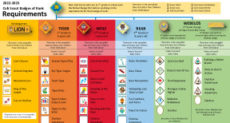 The mailbag brought a couple more questions to the Bobwhite’s attention in the last few weeks. I’ll take a stab at answering your conundrums this week.
The mailbag brought a couple more questions to the Bobwhite’s attention in the last few weeks. I’ll take a stab at answering your conundrums this week.
First, a question from an experienced den leader – and thank you for your service, as you are the front-line deliverer of Scouting to our Cub Scouts! – about a committee chair’s role in advancement:
Our committee chair insists on reviewing the Cub Scouts’ books and giving his approval before the Scouts’ required or elective Adventures are awarded. I’ve never heard of this in my many years as a Scouter. Does the committee chair have the right to collect the Scouts’ books to approve them after they complete requirements?
From the job description: “The Pack Committee Chair is appointed by the Chartered Organization to oversee the Pack Committee as they provide support to Den Leaders to ensure a quality program.”
The committee chair is the administrative head of the unit and really has no role in the program side of things – that’s the Cubmaster’s job. As such, he or she has no power of approval over the Cub Scouts’ advancement items. The responsibility of approval rests with the den leaders, and once approved, it’s approved and nobody else can take it back. The den leaders work with the advancement coordinator (who is a committee member) to record advancement and obtain the insignia (rank badges, belt loops, etc.).
What’s the reason behind the committee chair wanting to review the Scouts’ books? Does he perceive there is a “quality control” issue in the way requirements are met? Are things being signed off without the Scout doing his or her best? These issues are best met at the den level, not by the committee chair passing judgment on what the den leaders have done.
As a point of information, the committee chair could ask the den leaders how it’s going and perhaps ask to see one of the Scouts’ books with an aim to understand how the committee can better serve and support the den leaders. But it’s not the committee chair’s job to approve them. If it was, there’d be a spot for the CC to sign off in the Scouts’ handbooks. And, of course, all leaders should complete the position-specific training for their registered positions.
We’ll move on to a question about a topic that comes up frequently: the use of smartphones at camp.
One of the committee members recently suggested that there should be no electronics on camping trips. Until two years ago, our troop policy was very strict in that Scouts could have phones in the cars, but the phones stay in the cars when at camp. Some of the parents made the argument that a smartphone is actually a tool and a resource that a Scout could make use of, although the consensus seems to be that the Scouts are using them for entertainment. The Scoutmaster said the patrol leaders’ council should make the decision but that he’d share the parents’ concerns with them. Doesn’t the troop committee have the ability to set a policy on the use of electronics at camp?
Whether to permit the use of electronic devices at campouts and summer camp is something that has come up a lot in the past, mainly with respect to handheld video games, Walkman and MP3 players and other devices that are essentially for one-person entertainment. When smartphones came along we had to recognize that not only can they be used for playing games and communicating with friends who are outside the campout setting, but are also valuable as a tool. Scouts might be advised to bring to camp a map, compass, flashlight, camera, the Scout Handbook, a notepad, pictures of birds, insects, poisonous plants, etc. Now, stop to realize that a smartphone can be all these things and more. (Nobody has managed to build in a pocket knife or flint, just yet.) To that end, and to much pushback, the BSA added a “device pocket” to the uniform shirt when it was redesigned a few years ago (that’s what that pocket flap on the sleeve is for). In explaining the device pocket, Bob Mazzuca, then Chief Scout Executive, said that the Scouting program has to meet the Scouts where they are today and not try to bend them to conform to an outdated mode that we adults might be more familiar with. (Ever see a young person in action when asked a question? The first thing that comes out is the phone, and to Google for the answer. My son learned how to file his income taxes, not by asking dad, but by watching a YouTube video.)
Now, to your question of how to handle smartphones on campouts.
The adults may perceive a problem that the Scouts don’t think exists and would view any adult-imposed rules about it as arbitrary, so it’s important to define what we are going for, and how to go about it. The troop committee can probably make a rule about the use of smartphones at camp, but I like to avoid making more rules and rely instead on the ones we already have: the Scout Oath and Scout Law.
The Scoutmaster has the basic idea in mind – that it’s the Scouts’ troop – but that doesn’t give them carte blanche to do just anything. Clarke Green illustrated the point with an example of how a basketball team doesn’t just decide that they’re going to go play soccer instead. They play the game of basketball within the rules and bounds of the game, and the game of Scouting is no different.
While the Scouts see value in using smartphones on campouts, the adults want to avoid the temptation to use them for entertainment, communicating with outsiders and the like. Perhaps a good way to do this is to bring these concerns to the Scouts and ask them if it’s an accurate impression, and if it really is a problem. Assuming it is, then ask the Scouts how they would deal with the conflict between using a smartphone for purposes that fall within the bounds of the Scouting game and using it for other means. Ask them to come up with their own guidelines to ensure that smartphones get used only as directly benefits their activities within Scouting. Then, ask them what they think is the best way for the Scouts – not the adults – to enforce it. A Scout is Trustworthy; A Scout is Obedient.
In other words, help them realize that there is a problem to be solved, and ask them to come up with the solution. A couple Baden Powell quotes come to mind:
“It is risky to order a boy not to do something; for it immediately opens to him the adventure of doing it.”
“Correcting bad habits cannot be done by forbidding or punishment.”
This has the potential to be a particularly sticky problem, but making the Scouts partners in the resolution will work much better than imposing a rule on them. Good luck in dealing with your committee and your Scouts!
Have a question about something that’s come up in your pack or troop? Send me an e-mail and I’ll take a shot at answering your problem. Just use the Contact form in the menu at the top of any page.
This post first appeared on Bobwhite Blather.



